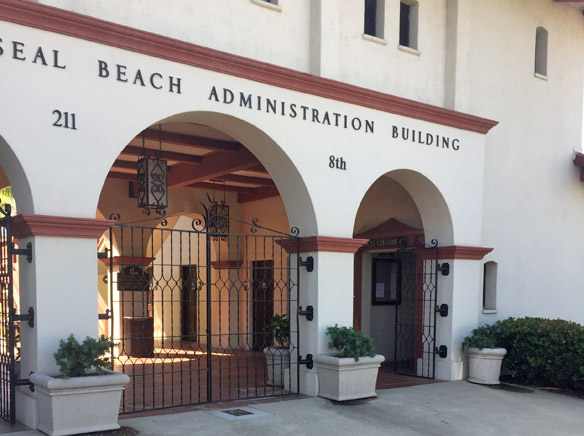The Seal Beach city budget may see a surplus of slightly more than $1 million if current projections hold true.
The projected surplus includes revenues from the Measure BB 1 cent sales tax that voters approved last year.
City staff gave the council an overview of the proposed 2019-2020 budget at the Wednesday, May 30, budget workshop. It lasted about four hours. The mayor requested staff change the budget to allow for a $2 million surplus. The city manager expressed concern that cutting the budget would reduce services to the community. (The following Wednesday, the projected budget surplus was revised to about $1.2 million.)
The consensus among council members last week was to wait until the Wednesday, June 5, Capital Improvement (infrastructure and maintenance) workshop before moving forward. (Both the May 30 and June 5 workshops were held after the Sun’s editorial deadlines.)
City Treasurer/Finance Director Victoria Beatley presented the budget overview last week. She told the council that staff projected revenues of $35,461,400 and expenditures of $34,440,500, leaving a projected surplus of $1,020,900. According to Beatley, the expense figures exclude General Fund capital.
Those figures had not changed as of Monday, June 3. However, Beatley confirmed that budget figures tend to be moving targets.
During public comment, a resident raised concerns about what he called a “bond measure,” which was apparently a reference to Measure BB. Finance Director/Treasurer Victoria Beatley made a point to tell the public that Measure BB was a sales tax, not a debt issue.
Staff projected that revenue from the 1 cent sales tax would generate $4.7 million for Seal Beach
Mayor Thomas Moore expressed surprise that the projected surplus was not more than $1 million, even with revenue from the Measure BB sales tax. “What they call the Tom Moore Tax in College Park West,” he said. “I was expecting to see $2.5 million or something like that,” Moore said.
He asked for staff to bring back a budget with a surplus of $2 million.
After Moore and other council members spoke, City Manager Jill Ingram expressed her concerns that staff would not be able to provide services to the public if cuts were made.
“We’re hearing a lot of comments and I’ve got to tell you I’m pretty concerned about it,” Ingram said, “because we presented to you a budget based on what we believe prudent and necessary to provide services for the community.”
Earlier in the four-hour meeting, Moore said, “I don’t want to be sitting here two or three years from now talking about how to dig ourselves out of another deficit.”
“My suggestion is we have a $2 million or more surplus in our budget,” he said.
Moore suggested hiring a consultant to look at city departments to do more with less.
Other council members had similar concerns.
District One Councilman Joe Kalmick asked if Moore was suggesting that costs be born entirely by hiring costs or by cutting services.
District Five Councilwoman Sandra Massa-Lavitt asked how many positions the city would be filling.
During the budget presentation, Beatley had indicated that the proposed 2019-20 budget proposal including filling positions that had been left unfilled in the current budget.
Beatley said she believed the budget proposed filling six or eight positions. Those positions included the director of Community Development, executive assistants in the offices of the city manager and Public Works.
“We’ve been less than lean,” said Beatley.
District Three Councilman Mike Varipapa saw the problem as a reserve issue. “But we have an obligation to think ahead three to five to 10 years,” Varipapa said.
“I would like not to think that far out because everything changes in five to 10 years,” Massa-Lavitt said.
Beatley suggested the council look at the Capital Improvement Program first. She said that is where savings would come from.
The consensus among council members appeared to be to wait until the Wednesday, June 5, budget workshop.
Varipapa complimented staff on their work on the budget. He said he knew it takes a long time.
“I think for next year we think about looking at it a couple of weeks earlier,” Varipapa said.
“In the background of all this, we have to meet the expectations of residents,” said Kalmick.
He pointed out that building permits could take longer to process. He asked if residents would have to lower their expectations.
City Manager Ingram, however, was apparently concerned about the mayor’s proposal to change the projected surplus figure. “I think if the council’s going to put a number out there for what your expectation is for a surplus, there should be a basis for it and there should be a policy for what you intend to do with the surplus,” she said.
She also said it would take time to find a way to cut the budget.
District Four Councilwoman Schelly Sustarsic said she didn’t know if it was realistic to see a $1 million budget change in one week.
Kalmick suggested staff come up with a “back of the envelope” figure.
“There are consequences for every decision we make about our fiscal policy,” Kalmick said.
Massa-Lavitt wanted to wait for the June 5 workshop.
Kalmick pointed out that the city was still involved with labor negotiations. He asked if the city was going to tell its employees there would be no adjustments beyond those required by contract or by law.




